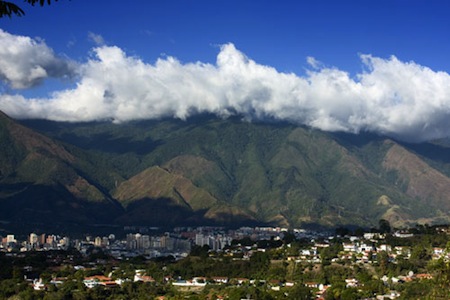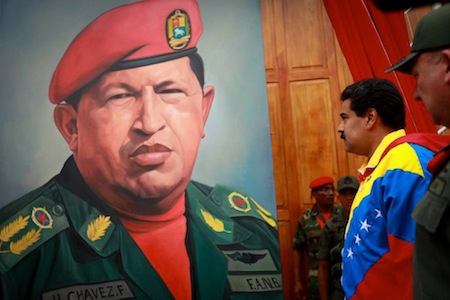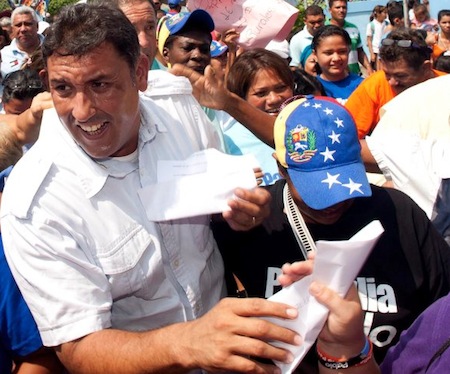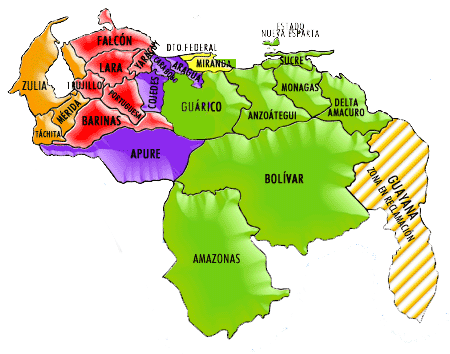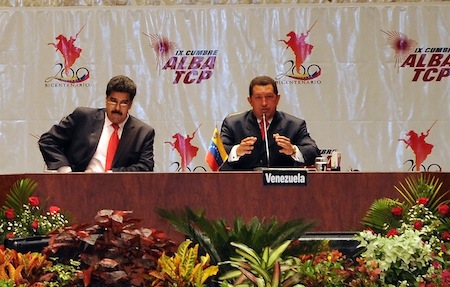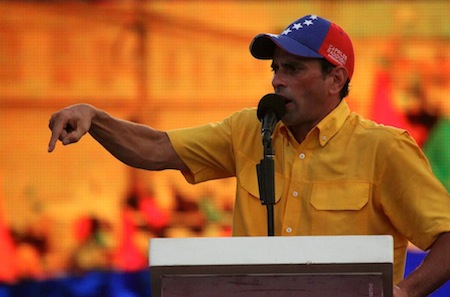Just days after the death of longtime Venezuelan president Hugo Chávez, his previous opponent in the 2012 election, Henrique Capriles, lost no time in taunting acting president Nicolás Maduro:![]()
Nicolás, nobody elected you president. The people didn’t vote for you, kid.
It was quite a bit out of character for Capriles (pictured above), who often campaigned against Chávez, then ailing with the cancer that ultimately took his life, with kid gloves — after all, Chávez remained the beloved champion of Venezuela’s poor, and Capriles himself pledged to retain the misiones that provided education and health benefits in the event of his election.
In fact, Capriles’s sneering and taunting attitude was more reminiscent of Chávez, who never lost an opportunity for a little name-calling.
Although Capriles is reported to have seriously considered boycotting the election, he announced March 10 that he would accept the presidential nomination of the opposition coalition, the Mesa de la Unidad Democrática (MUD) with the kind of intensity that critics claimed his previous 2012 campaign lacked. In a fiery, nearly hour-long speech, he attacked the record of chavismo and pursued Maduro with a newfound aggression, challenging Maduro by his first name (¡Y tu, Nicolás…) and attacking the government’s handling of the constitutional succession and its performance since Chávez won reelection:
Maduro was hand-picked by Chávez as his new vice president and anointed as his preferred successor, and he has — for now — secured the support of the Partido Socialista Unido de Venezuela (PSUV, or United Socialist Party of Venezuela) and much of the Venezuelan army, now sympathetic to the ruling chavista regime after 14 years of Chávez in power.
But from his newfound abilities in populist rhetoric and campaign aggression, it may well be Capriles who is becoming the true heir to Chávez.
For example, on March 10, in response to ‘homophobic’ slurs from Maduro, Capriles took the opportunity not only to deny them, but to make a full-throated attack on the machismo of the chavistas and to argue forcefully for social inclusion for all Venezuelans, no matter what their sexual orientation:
That takes a lot of brass — and perhaps it’s the kind of brass that comes from a campaign against Maduro that seems more doomed than the one last year.
The conventional wisdom is that Maduro will ride the wave of sympathy for Chávez to victory so soon after the funeral, and polls show that Maduro is leading Capriles, in some cases by a wider margin than the 11% victory Chávez won in 2011 (such as a recent Datanalysis poll that gives Maduro a 14-point lead).
Capriles has attacked the polls, too, arguing that the government are paying pollsters to show Maduro leading. True or not, it’s a classic play from the Chávez playbook — disregard the facts, and turn a negative into a way to attack your opponent.
What it means is that Capriles is running the kind of offensive campaign that Chávez ran throughout his career, and Maduro is running the kind of defensive, hesitant campaign that’s typically been associated with the opposition.
But regardless of whether Capriles has a chance to win, he’s now free to run against chavismo without having to run against the charismatic commandante himself.
After a setback for opposition forces in the regional and gubernatorial races in December 2012 (Capriles himself won reelection only narrowly against Elías Jaua, a well-financed former Chávez vice president), a feisty loss in the April 14 presidential election would not only energize the opposition, but keep it united and prepare it to take on the PSUV in parliamentary elections due in 2015.
Even more slyly, one of the subtle themes of the Capriles campaign is simply, ‘Maduro is no Chávez.’
The subtext here is that, even if you supported Chávez, and perhaps especially if you supported Chávez, you don’t necessarily need to support Maduro, who doesn’t measure up to Chávez. Capriles has argued that Maduro, in less than a hundred days as the de facto acting president during Chávez’s terminal illness, has already begun to dismantle the achievements of the Chávez era.
That’s one reason Capriles has been so aggressive in attacking Maduro’s February devaluation of the bolívar, Venezuela’s currency, which lowered its value by 32%. Maduro doubled down this week, however, announcing a second devaluation that is expected to cut even more deeply into the value of the currency, and a new foreign exchange system to assist importers acquire increasingly rare U.S. dollars. The devaluations are also designed to cut a budget deficit that swelled in 2011 and 2012 in advance of Chávez’s reelection, despite abundant oil wealth.
It’s also why Capriles has gone on the offensive about cutting subsidies to Cuba — it’s widely believed that Maduro was Havana’s preference as Chávez’s successor, hoping that Maduro’s election will secure the uninterrupted flow of oil subsidies, cheap credit and other goodies to the Castro regime. Again, the anti-Cuba rhetoric is subtle way of reclaiming nationalism at the expense of Maduro’s relatively weaker position. Capriles would never have been able to attack the nationalist bona fides of Chávez, the 21st century champion of ‘bolivarian’ revolution. Not so with Maduro.
Consider, too, this television advertisement from the Capriles campaign yesterday — although it’s only a simple 21-second spot, it’s a harsh indictment of chavismo that lists five reasons for change: violence, power outages, expropriations, deficient hospitals and lack of water:
Capriles may well still lose the election because the wall of sympathy for Chávez was always going to be too high to surmount.
But make no mistake, Capriles is certainly waging a more spirited campaign than anyone every really anticipated — it may not be enough to win the election, but it may well make it a far closer run than the chavista regime would have liked. That, in turn, will lay the groundwork for a future challenge if Maduro wins and conditions deteriorate in advance of parliamentary elections or before the next presidential election in 2018.

